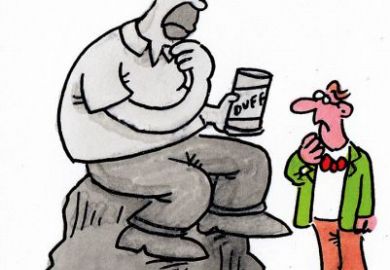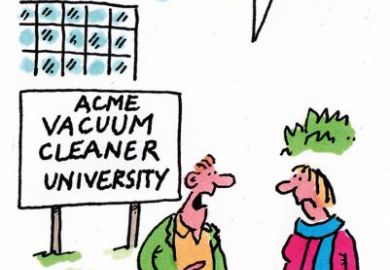
An Oxford college is to appoint a “class liberation officer” to protect working-class students from insults, The Sunday Times reported on 20 November. Students at St Hilda’s College voted to create the post after it was suggested that working-class students suffer from “microaggressions” and classism. One student at the college told the newspaper: “Insults such as ‘chav’, chav-themed social nights and questions such as ‘why are you wearing Primark?’ can make poor students feel upset and worthless.” Those seeking to defend working-class students at the college now just have to find some.
Police were called to a university talk by George Galloway after protesters “showered him with glitter”. The firebrand and former cat impersonator said his pregnant wife jumped to his defence during the incident while he was giving a talk at the University of Aberdeen, The Independent reported on 23 November. Mr Galloway tweeted later: “Someone calling themselves 'Trans' and an 'anarchist' led a five person attack on me on the platform at Aberdeen University. I continued. I now have an unknown substance in my eyes and lungs and feel a little unwell. But the struggle continues:-)” Times Higher Education salutes his indefatigability.
Students at City, University of London, "home to one of the country’s most respected journalism schools", have voted to ban The Sun, Daily Mail and Express from campus, The Guardian reported on 18 November. The university’s student union voted to ban the newspapers after considering a motion titled “opposing fascism and social divisiveness in the UK media”. All three newspapers have come in for criticism for their coverage of issues such as immigration and the Brexit debate, with one of the most recent controversies being front-page reaction to a High Court decision that MPs had to vote on when the UK's departure from the European Union is triggered. However, the union's decision has apparently not gone down well with those studying journalism, with The Guardian saying that a number were "looking to pull out of the union in protest against the decision, which they believe harms the university’s reputation”.
A website that has been asking students to “expose and document” academics who “discriminate against conservative students, promote anti-American values and advance leftist propaganda in the classroom” has prompted a string of joke entries. The site, called Professor Watchlist, launched on 21 November, has seen profiles uploaded of dozens of real US academics who apparently have a “record of opposing freedom of speech on campus”, Inside Higher Ed reported. But other suspicious leftie professors reported to the site include Indiana Jones (who is “clearly biased against white fascist groups” owing to his killing of Nazis); Third Rock from the Sun’s Richard Solomon (“illegal alien, probably an international spy and security risk”); and Professor Snape from the Harry Potter books (who “killed Dumbledore”). Despite the satirical response from many, others raised serious concerns about the site and the accuracy of some of listings featuring real-life academics. Hans-Joerg Tiede, associate secretary for tenure, academic freedom and governance at the American Association of University Professors, said the AAUP had spoken out against “organisations that conduct these kinds of activities going back to the 1920s”.
The funding of pastoral care services at British universities has been thrown into the spotlight after it emerged that a coroner is investigating the deaths of three students – all believed to be first years – at the University of Bristol. The Guardian reported that online tribute and fundraising pages for two of the three cases – which were all unrelated – suggested that they had taken their own lives. A spokesman for the university said the deaths were not being treated as suspicious but it would “be investigating if there is anything we need to do to learn from these sad events”, although he added that “we have no reason to believe they represent a wider issue”. However, Metro reported that the father of another student at Bristol had criticised the university for not publicising the deaths, adding that it was “something which should be discussed” and that there was not “enough pastoral care for students once they arrive at university”.
Register to continue
Why register?
- Registration is free and only takes a moment
- Once registered, you can read 3 articles a month
- Sign up for our newsletter
Subscribe
Or subscribe for unlimited access to:
- Unlimited access to news, views, insights & reviews
- Digital editions
- Digital access to THE’s university and college rankings analysis
Already registered or a current subscriber?





